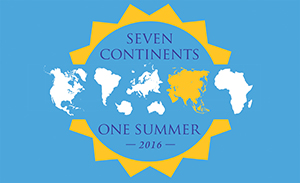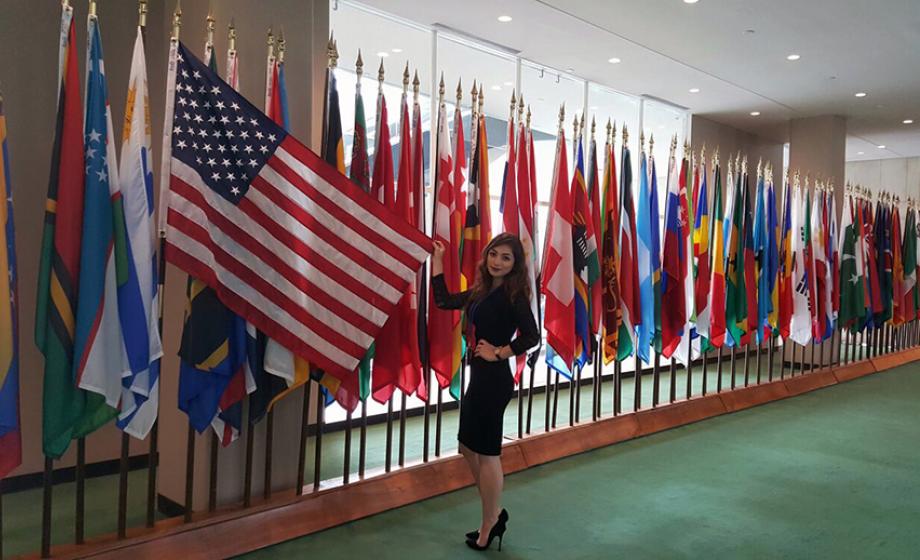
There are few places Dea Dodi ’17 likes to be more than in the United Nations building in New York. You could say she’s been working her way there since the tender age of 12 when she first asked her parents what the term “political science” meant.
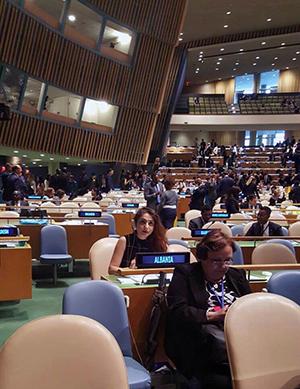
Fast forward nine years and Dodi, a political science and economics major at Clark, not only worked as an adviser for the Permanent Mission of Albania to the United Nations and attaché to the ambassador of Albania this summer, she’s also working with Human Rights Watch (HRW) in the Middle East and Northern Africa division in Washington.
“I split my summer between the U.N. and the HRW because I couldn’t choose between the two,” she says.
In a post on her “Mission Deconstruct” blog, she writes about her first week working at the U.N.:
“For those like me, who are still pursuing their formal education while working at the U.N., the experience is entirely what you make out of it. The U.N. offers channels to grow from and hone your skills as a critical thinker, speaker and delegate, create relationships with extraordinary people who have made a career out of international service and humanity, and infinitely increase one’s knowledge base at an unprecedentedly accelerated and effective pace, but it does not force them upon anyone.”
Dodi took advantage of that pace. In her first week there, she represented Albania in a U.N. Economic and Social Council committee meeting and attended two U.N. Security Council meetings, during one of which she heard U.S. Ambassador to the United Nations Samantha Power, whom she also met later at an event for refugees, address the delegates. She would become a regular attendee of Security Council meetings during her time at the U.N.
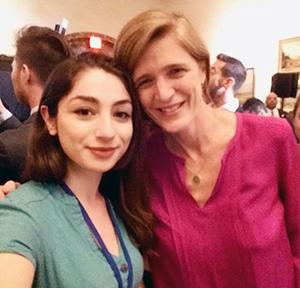
She thrived on the pace and the fact that every day brought something new:
“What excited me the most, was the general absence of expectancy of the routine of daily tasks that can make for a monotonous existence. Instead, U.N. work relies heavily on adaptation to circumstance, and context and constant prioritization and emergence of new — and sometimes unexpected — tasks. In that way, the day does not have a fixed ‘end’ because the role of a delegate is all-encompassing which allows me to do what I love most: being on the constant move and actively harmonizing goals and assignments into one creative and efficient multifaceted framework.”
Dodi will get the chance to channel the experience she gained this summer and her passion for international relations into Clark’s Model United Nations program when she returns for her senior year this fall. The award-winning delegate of the traveling team has been a member since her first year at Clark; she also founded the Clark International Affairs Society.
“Since I have had an affinity towards global affairs for as long as I can remember, I wanted to be part of a community at Clark where I could advance my passions for international relations and practice diplomacy,” she says via email. “Sometimes, traditional problems require non-traditional ideas and thought in order to be effectively and efficiently tackled, and Clark inspires that critically minded culture by teaching students how to deconstruct whatever subject matter they care about to its atomic parts.”
She credits her professors — Michael Butler, Richard Peet, Kristen Williams, Ora Szekely and Srinivasan Sitaraman (faculty adviser for Model U.N.) — for helping deepen that passion and inspire her work.
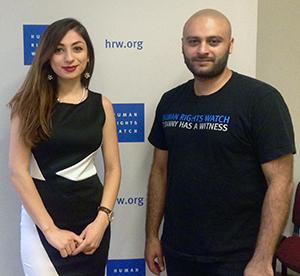
“[They have] profoundly helped me in properly dissecting and internalizing every aspect of my practical and theoretical learning,” she says. “[Their] devotion to their work and students makes the Clark campus a center of healthy idea-exchange and has directly influenced students in the successful pursuit of their academic and professional lives.”
Dodi’s work at HRW is helping to fulfill the organization’s mission, which she says is “to investigate and shed light on human rights abuses throughout the world and sensitize states and leaders to respect human rights and adhere to standards of international law.” She says it includes producing reports, working with direct interviews from people on the ground and collaborating with other organizations to “validate the experiences of victims, recognize where the abuse is happening and help influence reform” on her focused areas of coverage: Iraq, Jordan, Oman and Morocco. Her work has also helped her develop her Arabic skills.
“Working at the U.N. and HRW has been like diving headfirst into expansive seas whose waters you do not know the full depth of, and whose scope of life and matter is always prone to evolution and individual discovery,” she says. “In those terms, even though I have not gone to the beach this summer, I am happy to still have become a better swimmer.”
This story is part of our 7 Continents, 1 Summer series, which highlights the interesting work that Clark students, faculty, alumni and staff are doing all over the world. Have a great story of your own to share? Let us know and we’ll be in touch.
She’ll keep her eye on international relations — including during a return trip to the U.N. in September to help the Albanian Mission during the General Assembly — as she continues her studies, but says she still has much to learn.
“I can see myself working in diplomacy in the future, but, as always, my primary focus and commitment for the time-being is to continue growing academically and learn more about my chosen fields,” she says.
As for this summer, she’s grateful for her experience.
“It has truly been a summer of international relations, and I have loved and appreciated every moment of it,” she says. “After all, it isn’t every day you have front row seats (quite literally) to diplomatic history in the making. Unless, that is, you work at the U.N.”
You can follow Dodi’s updates on her blog at missiondeconstruct.wordpress.com, or follow her journey in pictures @wineandwords on Instagram.

